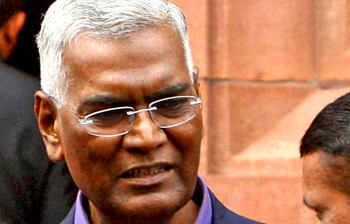Bhubaneswar, Jun 11: Accusing NDA of "undermining" Parliamentary democracy and concentrating all powers in the Prime Minister's hands, the CPI on Wednesday said BJP must be defeated in Bihar assembly polls.
 "Ever since BJP-led NDA came to power, Parliamentary democracy has been considerably undermined while all powers are concentrated with Prime Minister...this is dangerous," CPI National Secretary D Raja told reporters.
"Ever since BJP-led NDA came to power, Parliamentary democracy has been considerably undermined while all powers are concentrated with Prime Minister...this is dangerous," CPI National Secretary D Raja told reporters.
Asking BJP to remember that India does not have Presidential form of government, Raja charged NDA government of patronising corporates at the cost of poor farmers and being dictated by 'Sangh Parivar' outfits.
"BJP appears to have become a political arm of RSS. As a result, the social and secular fabric of the country is threatened and there seems to be a challenge to the Constitution," he claimed.
Under these circumstances, there is a need to stop and defeat BJP in the Bihar assembly election as it would have considerable impact on national politics, Raja said.
CPI, which has taken cognisance of the coming together of some political parties for Bihar polls, would consult other Left outfits on the issue before taking a decision, he said.
Stating that the first priority is to strengthen unity and coordination among all Left Parties, he said CPI national council is slated to meet towards the end of the month and a decision on joining the alliance of JD(U) and RJD could be taken then.
Before that, the party would analyse the situation and see what kind of adjustments the other political parties are interested in, Raja said.
On the question of Congress becoming a part of a secular front, the CPI National Secretary said Congress should review its neo-liberal economic policies which, he said, were responsible for soaring inflation and hitting common people hard.
"Congress must change its economic policies," he said.
Slamming Narendra Modi-Government for making tall claims about its one-year rule, Raja claimed it has done little for the poor and farmers and its promises of ensuring good days (achche din) and bringing back black money from abroad have been proved hollow.
"Where are the good days? When will they come? Infact nobody knows. BJP had promised to retrieve black money and stated that every citizen would get Rs 15 lakh. However, no
such thing has happened so far," he said.
Claiming that a major achievement of NDA rule was that corporate houses have become very powerful as they dictate and influence policies, Raja said Modi government is patronising corporates by way of many concessions and exemptions.
Corporate tax was reduced from 30 per cent to 25 per cent in the budget, he said
Mounting a scathing attack on the BJP government, Raja said support to social sector was substantially slashed particularly in areas like education, health, welfare and
similar other activities.
Describing the Modi government as anti-poor and anti-farmer, the CPI leader said farmers are highly distressed in the absence of remunerative prices for their produce and in the midst of heavy debt burden.
Despite its loud claims, the NDA government has done everything to weaken economic federalism. Funds for several schemes have been stopped, curtailing the economic powers of the states and their share, he added.
Claiming that Modi government is desperate about the land bill in its bid to favour the corporates, Raja said there was no need for bringing an ordinance when the land bill has been referred to Joint Committee of Parliament.
"The move is definitely a challenge to Parliament," he said, adding, CPI would intensify its fight against the "anti-farmer" measure.
Hitting out on NDA on foreign policy, Raja said nothing has been initiated by Modi Government and whatever is being done is only part of an ongoing process.
The PM's visits to countries like China, Canada and Australia were routine, he said, adding, while visiting Israel, the Prime Minister should not ignore the Palestinian cause.
The CPI leader also slammed the Centre for its 'silence' over fishermen issue in Sri Lanka.





Comments
Add new comment